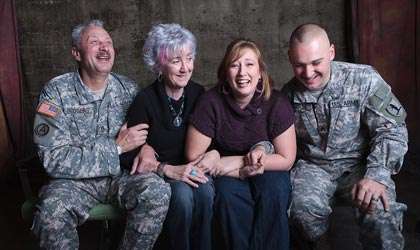
Operation Us
The Operation Us project has joined forces with The Murney Clinic. All our relationship education is now under a single banner.

Walk-In Hours
We're pleased to announce the availability of Walk-In service hours at our community service clinic.
Get More Information
Clinic Director
Dr. Jennifer Baker has been appointed as The Murney Clinic's new director, which brings our mental health and Operation Us activities under one roof.
Read More About Our New Director
- Operation Us
- Walk In Hours
- Clinic Director
“Think of a happy memory from your childhood that you would be willing to share with the group.” These were my instructions to a collection of men in the Greene County Jail where I was teaching a parenting class.
After a brief silence, each began hesitantly sharing his memory. One recalled a happy time in his foster home. Another remembered the summer before his mother died. Most reminisced about simple things—a picnic, rolling down a big hill in the grass, being together with someone they loved. Sadly, none recollected about a happy time with his father.
In retrospect, I shouldn’t have been surprised. Although statistics differ, most identify father absence, as a significant predictor of involvement in the criminal justice system, especially for young men.
Community Focus 2011—Red Flags and Blue Ribbons
The recent Community Focus Report for Springfield and Greene County identifies a number of strengths in the area of public order and safety. Addressing the police/fire pension plan, collaborative efforts to address public safety, development of emergency resources and the Greene County DWI and drug courts were all recognized as “blue ribbons.” In spite of these strengths, however, rising crime rates continue to be an issue as reflected in increases in illegal drug use, alcohol-related accidents, domestic violence and property crimes. All of these concerns have continued to put stress on the system in the form of inadequate jail space and inadequate staff coverage, with the report noting that the seriously overcrowded Greene County Jail remains a threat to public safety.
Father Absence
Children without a dad at home are likely to be poor, have difficulties in school, have more mental and physical health-related problems, and get involved with the criminal justice system. If we want to do something about over-crowded jails, we need to do more than build more correctional facilities. We need to consider family structure, as it is the number one predictor for boys being incarcerated by age 30, even when controlling for race, socio-economic status and other key variables. Children from disrupted families have more difficulties in school. And, although there are many great stepfathers, only a boy’s father, living in the same home with him as he is growing up, proved to be significant in predicting whether or not he would end up in the hands of authorities.
According to David Lykken, “Most of the 1,400,000 men currently locked up in American prisons would have become tax-paying neighbors had they been switched in the hospital nursery and sent home with a mature, self-supporting, married couple.” Switching children at birth is not an option, but doing everything we can to help couples—married or unmarried—succeed in forming a safe, stable home for their child is. When we do this, we not only lower the ever-increasing number of those in prison, we also reduce poverty and improve child outcomes.
If we don’t see the relationship between these negative outcomes for children and responsible fatherhood, we are unlikely to help couples having a baby form and maintain a healthy home for the benefit of their child. We will continue to emphasize the need for public safety, but do little to help the expectant parents form and maintain a healthy home that supports and promotes father involvement for the benefit of the child.
Reentry Programs for Ex-Offenders
Some of the most successful reentry programs helping ex-offenders return to society, get jobs and become responsible citizens, also emphasize having a good support systems (as might be found in a healthy marriage) and being involved with one’s child. It turns out that having a relationship with and contributing to the well-being of one’s child or children is a powerful motivator to staying out of trouble and out of jail. Perhaps we need to think harder about how to strengthen the families of ex-offenders when they return to our community. Would that be a great “blue ribbon” for the future?
For more information, or to offer your help and/or resources, please contact the Operation Us office at (417) 823-3469 or email Dr. Jennifer Baker at This email address is being protected from spambots. You need JavaScript enabled to view it. .
Love and Logic Parenting - Wednesday, July 11, 2012 @ 6:00 PM
A Recipe for Lasting Love - Tuesday, July 17, 2012 @ 6:00 PM
Mystery Date Night - Friday, July 20, 2012 @ 6:00 PM
Couples That Rock - Saturday, July 21, 2012 @ 9:30 AM
How to Avoid Falling for a Jerk or Jerkette - Saturday, July 21, 2012 @ 10:00 AM
Commitment To Care
The Murney Clinic is pleased to say that friends and family members of satisfied former clients refer the vast majority of our new clients. In an effort to meet the continually changing needs of the community, we welcome feedback on how we can improve.
If you have a suggestion for a service that isn't currently offered, or any idea for improvement, please contact the Director of Marketing.



